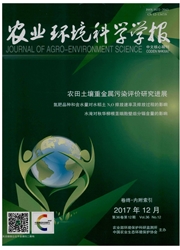

 中文摘要:
中文摘要:
采用沟渠沉积物吸附效应实验和沟渠沉积物硝化效应实验方法,研究了沟渠沉积物对氨氮的吸附和硝化能力并对比了两者的截留效应,探讨了pH值、温度、进水氨氮浓度和DO对沟渠沉积物截留氨氮的影响。结果表明,沟渠沉积物对氨氮具有很强的吸附和硝化能力,最大饱和吸附量和硝化量分别约为1.3和0.15mg·g^-1;对比沟渠沉积物吸附量和硝化量,沟渠沉积物吸附作用在沟渠沉积物截留效应中占主导作用。沟渠沉积物吸附最佳pH为7.0~9.0;在20℃到40℃温度范围内,随温度的升高,吸附容量逐渐增大;DO通过影响微生物种群来间接影响沟渠沉积物截留氨氮的截留效应。
 英文摘要:
英文摘要:
In order to effectively intercept and wipe off nitrogen in agricultural soil without polluting water body, the NH4^+-N capacity of adsorption and nitrification of ditch sediment was researched and their interception was also contrasted, and further more the influence of pH, temperature, inlet density and DO on interception rate of NH4^+-N were also discussed. Two experiments of adsorption and nitrification were carried out, and the results showed that: ditch sediment had strong capability of adsorbing and nitrifying NH4^+-N, the maximal saturated adsorption and nitrification of ditch sediment were about 1.3 mg·g^-1 and 0.15 mg·g^-1, respectively. Compared to the nitrification of ditch sediment, the adsorption of that was dominant in interception. The optimal pH value of sorption was 7.0~9.0. At 20~40℃, the adsorption capacity of ditch sediment increased with the temperature rising. DO could indirectly influence the interception of NH4^+-N in ditch sediment through affecting the microbe community. These results can supply technical service for effectively controlling nitrogen pollution.
 同期刊论文项目
同期刊论文项目
 同项目期刊论文
同项目期刊论文
 期刊信息
期刊信息
